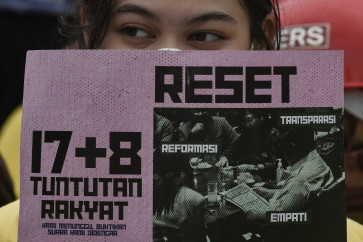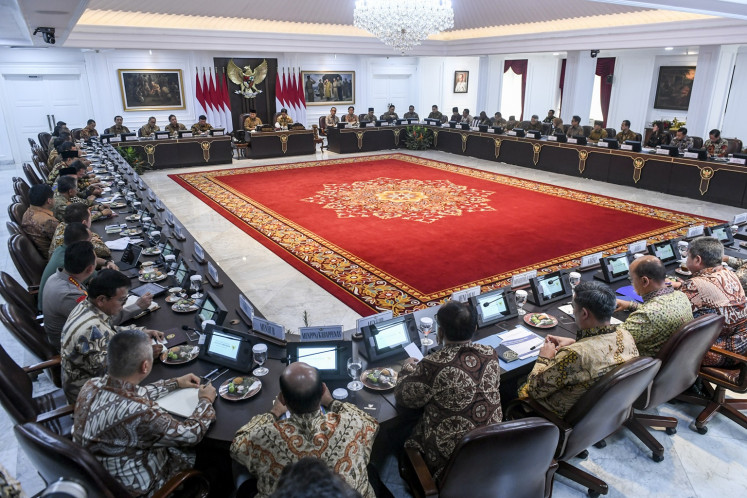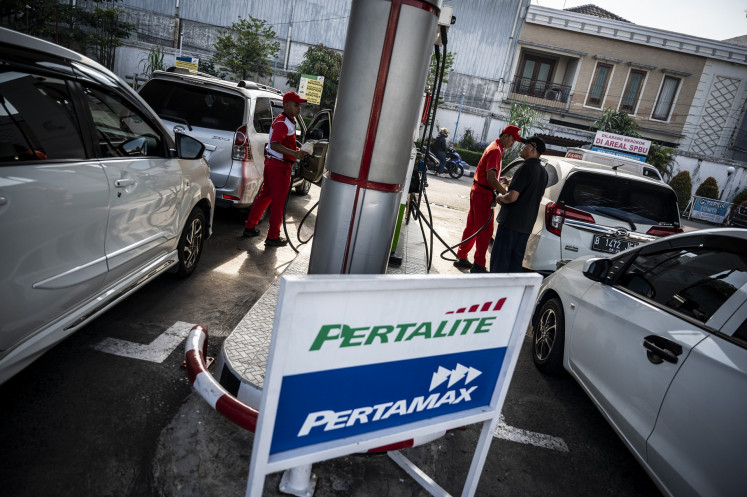Popular Reads
Top Results
Can't find what you're looking for?
View all search resultsPopular Reads
Top Results
Can't find what you're looking for?
View all search resultsBI ensures sufficient US dollar supply
No worries: A teller counts rupiah banknotes at a BNI Syariah branch in Jakarta on Friday
Change text size
Gift Premium Articles
to Anyone
N
span class="caption" style="width: 510px;">No worries: A teller counts rupiah banknotes at a BNI Syariah branch in Jakarta on Friday. Bank Indonesia has played down concerns on possible dollar shortages. (JP/Nurhayati)
The central bank has dampened concerns about a possible dollar shortage in the market, saying there will be a sufficient supply of greenbacks in the coming months on the back of a likely improvement in exports and stronger inflows of foreign funds.
'There should be no concerns or fears about a shortage of dollars,' Bank Indonesia (BI) Deputy Governor Perry Warjiyo said in Jakarta on Friday. 'It has always been our commitment to supply dollars to the market when necessary, so that the rupiah remains stable at its fundamental rate.'
Foreign investors are now concerned over pressure on the rupiah, questioning whether there will be sufficient dollars in the currency market in the coming months.
In a recent interview with The Jakarta Post, JPMorgan Chase senior country officer Haryanto T. Budiman said that foreign investors were concerned that the possible shortage of dollars in the next few months would put further pressure on the rupiah.
He said that in addition to foreign debt payments, dollar demand between May and June usually soared as foreign companies would have to repatriate their dividends to their headquarters overseas.
Perry argued, however, that in the coming months, the dollar supply would be sufficient to meet the high demand. There would likely be an increase in earnings from exports, meaning that there would be an additional supply of dollars for local banks to meet the surging demand.
As of January, total dollar export receipts deposited in local banks amounted to $13.3 billion, or 85 percent of total export transactions during the month of $15.2 billion, according to BI data. The percentage of export receipts in local banks could still be pushed upward, a situation that would add more dollars to the local market, according to Perry.
More dollars will also come from foreign fund inflows, which typically become stronger in the second quarter. 'In addition, the current account deficit will narrow in the second quarter, eventually leading to an improvement in our balance of payments,' said Perry. 'All these factors will help stabilize the rupiah.'
On the concerns of escalating dollar-based debts by the private sector, the BI deputy governor said that 'there was no indication of currency or maturity mismatches' that might destabilize the local currency market.
The rupiah strengthened 0.1 percent on Friday to close at 9,713 per dollar, according to prices from local banks compiled by Bloomberg.
However, the rupiah 'is not being traded at its fundamental value' as the present rupiah rate might be influenced by the central bank's intervention, said Lana Soelistioningsih, chief economist with PT Samuel Sekuritas.
'Realizing that the rupiah is currently hovering at an unreasonable value, many exporters have been hoarding their dollars, refusing to convert them into rupiah,' she said on Friday.
Lana explained that exporters opted for dollars because they feared ongoing intense pressure on the rupiah. 'This has led to a shortage of dollars in the market.' The dollar hoarders also had concerns about BI's depleting foreign exchange (forex) reserves, which touched $104.8 billion at the end of March, a two-year low. 'If the reserves fall below the psychological threshold of $100 billion, it will spark negative sentiment toward the rupiah,' Lana warned.










